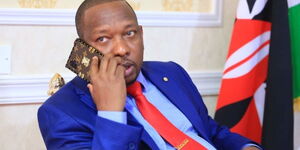Kenyans are set to continue facing hard economic hardships despite President William Ruto settling in office and embarking on his economic recovery plan.
According to the Parliamentary Budget Office forecast for 2022-2023, Ruto's government is steering towards a grim future, especially in lowering the prices of basic commodities and services.
The Parliamentary Budget Office forecast indicated that fuel prices, Unga, transport costs, acquiring loans and even building materials would increase towards the end of the year.
Factors That Will Affect Ruto's Administration
According to the report, inflationary pressures are likely to remain elevated for the rest of the year. This is due to the Russia-Ukraine conflict, which will further lead to supply chain disruptions resulting in higher importation costs for fuel in addition to other crucial products such as fertiliser, wheat, edible oils, iron and steel.
MPs indicated that short rains may generally affect the agricultural sector leading to increased food prices.
"The seasonal outlook for the October to December 2022 short rains season indicates a strong likelihood of delayed onset and generally poor distribution of rainfall in both time and space. Without targeted interventions, this will impact negatively on agricultural performance and could continue to be a drag on growth as a result of the increased cost of agricultural produce," the report indicated.
Deputy President Rigathi Gachagua indicated that former President Uhuru Kenyatta left the country's economy in a dilapidated state. But according to the report, Ruto's plan to revive it is set to be slowed down by the weakening of the Kenya Shilling against the US dollar.
Kenyans may access loans at a higher rate after the Monetary Policy Committee (MPC) signalled a gradual increase in Central Bank Rate (CBR).
"In September 2022, the Monetary Policy Committee revised the Central Bank Rate (CBR) upwards to 8.25 per cent from 7.5 per cent in July 2022.
This upsurge may be partly attributed to an increased appetite for domestic borrowing by the government, which tends to crowd out the private sector," the report further indicated.
The report also indicated that the scaling down of the fuel subsidy will increase the cost of energy leading to higher input and production costs which will invariably be passed on to the consumer.
This will also affect the transportation cost if immediate intervention plans will not be unveiled by President Ruto's government.
Parliamentary Budget Office estimated that inflation will average 7.6 per cent for the year 2022. Higher inflation is likely to erode consumers' purchasing power, leading to a slowdown in consumption and overall economic activity.
The impact will be disproportionately felt among lower-income earners, who may then be pushed further into poverty.
The continued acceleration of Treasury Bill and Treasury Bond rates will have a bearing on the cost of financing the 2022-2023 budget.
"This may be illustrated by the recent underperformance of the August 2022 treasury bond, where the National Treasury sought to raise Ksh50 billion but was only able to accept bids worth Ksh38.5 billion as investors sought better returns," the report added.
A drop in diaspora remittance was also highlighted among the hitches that may affect Ruto's government and the inability to raise resources domestically.
To overcome the challenges, the Parliamentary Budget Office opined that Ruto need to restrategise and set up short-term economic intervention plans.












